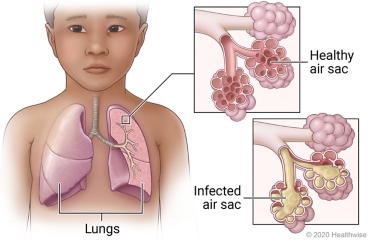
Overview
Pneumonia is a serious lung infection usually caused by viruses or bacteria. Viruses cause most cases of pneumonia in children. The illness may be mild to severe.
Your doctor will prescribe antibiotics if your child has bacterial pneumonia. Antibiotics do not help viral pneumonia. In those cases, antiviral medicine may be used.
Rest, over-the-counter pain medicine, healthy food, and plenty of fluids will help your child recover at home. Mild pneumonia often goes away in 2 to 3 weeks. Your child may need 6 to 8 weeks or longer to recover from a bad case of pneumonia.
Follow-up care is a key part of your child's treatment and safety. Be sure to make and go to all appointments, and call your doctor if your child is having problems. It's also a good idea to know your child's test results and keep a list of the medicines your child takes.
How can you care for your child at home?
- If the doctor prescribed antibiotics for your child, give them as directed. Do not stop using them just because your child feels better. Your child needs to take the full course of antibiotics.
- Be careful with cough and cold medicines. Don't give them to children younger than 6, because they don't work for children that age and can even be harmful. For children 6 and older, always follow all the instructions carefully. Make sure you know how much medicine to give and how long to use it. And use the dosing device if one is included.
- Watch for and treat signs of dehydration, which means that the body has lost too much water. Your child's mouth may feel very dry. Your child may have sunken eyes with few tears when crying. Your child may lack energy and want to be held a lot. Your child may not urinate as often as usual.
- Give your child lots of fluids. This is very important if your child is vomiting or has diarrhea. Give your child sips of water or drinks such as Pedialyte or Infalyte. These drinks contain a mix of salt, sugar, and minerals. You can buy them at drugstores or grocery stores. Give these drinks as long as your child is throwing up or has diarrhea. Do not use them as the only source of liquids or food for more than 12 to 24 hours.
- Give your child acetaminophen (Tylenol) or ibuprofen (Advil, Motrin) for fever or pain. Do not use ibuprofen if your child is less than 6 months old unless the doctor gave you instructions to use it. Be safe with medicines. Read and follow all instructions on the label. Use the correct dose for your child's age and weight. Do not give aspirin to anyone younger than 20. It has been linked to Reye syndrome, a serious illness.
- Make sure your child rests. Keep your child at home until any fever is gone.
- Place a cool-mist humidifier by your child's bed or close to your child. This may make it easier for your child to breathe. Follow the directions for cleaning the machine.
- Keep your child away from smoke. Do not smoke or allow anyone else to smoke in your house. If you need help quitting, talk to your doctor about stop-smoking programs and medicines. These can increase your chances of quitting for good.
- Make sure everyone in your house washes their hands several times a day. This will help prevent the spread of viruses and bacteria.
When should you call for help?
Call 911 anytime you think your child may need emergency care. For example, call if:
- Your child has severe trouble breathing. Symptoms may include:
- Using the belly muscles to breathe.
- The chest sinking in or the nostrils flaring when your child struggles to breathe.
Call your doctor now or seek immediate medical care if:
- Your child has any trouble breathing.
- Your child has increasing whistling sounds when they breathe (wheezing).
- Your child has a cough that brings up yellow or green mucus (sputum) from the lungs, lasts longer than 2 days, and occurs along with a fever.
- Your child coughs up blood.
- Your child cannot keep down medicine or liquids.
Watch closely for changes in your child's health, and be sure to contact your doctor if:
- Your child is not getting better after 2 days.
- Your child's cough lasts longer than 2 weeks.
- Your child has new symptoms, such as a rash, an earache, or a sore throat.
Where can you learn more?
Go to http://www.healthwise.net/patientEd
Enter Z300 in the search box to learn more about "Pneumonia in Children: Care Instructions".
Current as of: September 30, 2025
Author: Ignite Healthwise, LLC Staff
Clinical Review Board
All Ignite Healthwise, LLC education is reviewed by a team that includes physicians, nurses, advanced practitioners, registered dieticians, and other healthcare professionals.

